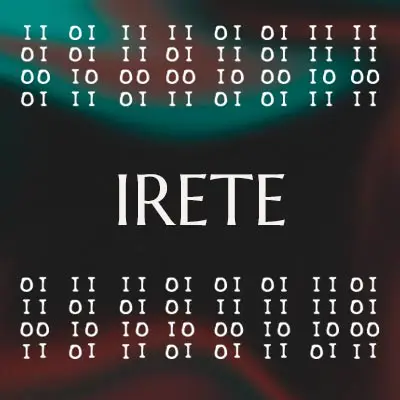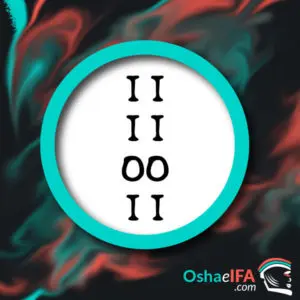Treatise of Irete and her Omoluos

Treatise of Irete meji and also that of its 16 combinations, this treatise ranges from Irete Meji to Irete File.
Sayings, Patakies, Ebo, what is born, recommendations and variants of each Odu or Sign of Ifa. Oshaeifa.com brings you the treatise you are looking for to expand your knowledge of literature and the Ifa Corpus.
Encyclopedic treatise of Ifa Book of Irete.
The birth of the Odu BABA IRETE MEJI.
After acquiring the secret of prosperity, EJI ELEMERE decided it was time to come into the world. He went to two Ifa priests, called EJI WEWEWE, OGBOJO and OJO GIIRI, oun gbati ba owuro. These were the two Ifa priests who guessed for him.
They advised him to make sacrifice to avoid problems with having children in the world. They told him to serve his Ifá with a head and to give a he-goat to Eshu. He quickly made sacrifice and went out into the world.
Upon arrival, he went to a town called OKE MESI, where he practiced the art of Ifá. He was prosperous but had no children. Then he married and his wife gave birth to a girl. Without
However, he was eager to have more children. One day, he decided to consult his Ifa about why he could not have a male child, if in his customary sacrifices during his annual Ifa festival he was successful. He invited all the surrounding Ifá priests to participate.
After the invitation, his Ifá told him to make sacrifice with a whole deer (AGBORIN in Yoruba or ERHUE in Benin). Since he was not a hunter, he traveled to town
near UJO where he practiced, at the beginning, the art of Ifá. When he arrived, he met a woman named KPOROYE, who was married but did not have children and it was by divination to know what to do in order to have them. He guessed for her and assured her that he would have one if he could sacrifice a chicken and a rabbit.
Quickly, the woman supplied the rabbit and the chicken. EJI EDE used the hen to sacrifice to Ifá and prepared the rabbit to offer it to the Ancients of the Night. He told her to deposit the sacrifice near a dug hole and to do it at night.
After making the sacrifice, he left for the forest to find some leaves for his work and went with his magnetic glass mirror. While he was looking for the leaves, he saw through his mirror a deer in the distance and conjured it to come to where he was so that he could catch it.
It was a very large deer. The animal obeyed his command and he caught it. As soon as the deer realized that it was in danger, it began to fight with its captor. In the fight, they both fell into a deep pit. Inside the ditch they encountered a long snake that had also fallen there. Once inside the hole, he was able to kill the deer with a stake but could not bring it to the surface and screamed for help. Nobody heard him, so he had to spend the night in the hole.
The next morning, he looked through his mirror and saw a group of children going into the woods to check their traps and then he sang to them:
OMONDE UDO
MOYA GAMILA
ATHANUS, ABO
AARITIJE, AARITIMU
ELA MINI OLOFIN YI
ELA MINU OLOFIN YI ORUNMILA
ELA MINU OLOFIN YII OOO.
When the children heard his song, which was a call for help, they went to the ditch. When they saw him, they wondered what they could do to help him out of the hole, so they left frustrated. The time came for the adults to go to their farms when he saw them through his mirror and sang again.
AGBA UDO MOYA GBAMILA
AGBA UDO MOYA GBAMILA
His song attracted the men and they went to the hole to see him. When they saw it, they scoffed, wondering how a doctor who was able to save others could not save himself. They ridiculed him and repeated the words he always used when he asked them to make sacrifices with chickens, goats, and male goats. And without making any effort to rescue him, they left.
The time came for the women to go to the market and, after seeing them through the mirror, he sang to them:
OBINRIN UDO MOYA GBAMILA
OBINRIN UDO MOYA GBAMILA
When they heard the cry for help, they went to see him in the hole and recognized him. They also challenged him and told him that if he was as skilled as he claimed to be, he shouldn't need the help of others to get out of the hole. They too ridiculed him, because of all the meat and money he had taken from them in the past and left without helping him.
Then, APOROYE, whom he had advised to deposit his sacrifice near a hole, was going to fulfill it when he saw her through the mirror. After depositing it, she turned to return, but he sang from within:
GO OMON ABALU
ODU OMUN
EKPO JERE OTIKPA
imon gabamila
When she heard the song, she returned to the hole and saw him inside it. She asked him how he got there and he explained that he fell into a trap while trying to catch the deer with which he was to make the sacrifice. He appealed to her to remove it.
She complained that she had nothing to help him out with. He then advised her to remove her turban and drop it into the hole, while quickly grabbing a
extreme. When she extended the turban down, it did not reach the bottom. He then conjured the turban to extend downward and it obeyed his command until he could hold onto it. First, he tied it to the leg of the dead deer. The woman wondered if she could get him and the deer out. But he insisted that he couldn't go out without the deer. Then, he sang the following song:
BAMI GBE BARA
GBEGBE LEYIN
GBEGBE MOLE
(This is the song used by Ifa priests to move Ifa from one position to another).
When they were almost completely out of the hole, the leg of the deer to which the turban was attached separated from the rest of the body and fell into the hole. At the same time, APOROYE fell on her back and the clothes she was wearing fell off and she was naked.
The sight of the naked woman was too much for EJIEDE's resistance. Instantly, he pounced on the woman, who reminded him that it was forbidden
make love on the bare earth. Then he leaned back and plucked enough leaves from the Ikin bush to make a makeshift bed and proceeded
properly to make love to her. Annoyed that EJIEDE had taken advantage of her after giving him a hand, she hinted that she had just finished her
menstruation. He told her not to worry, because she was going to get pregnant after that incident and give birth to a son.
However, before leaving, the woman insisted on finding ways to locate him in case her prognosis came true. He informed the woman that he was from a place called OKE MESI. His house was purified with coloring matter. He added that there was a dried human corpse at the entrance and that there was a tree at the main entrance to his outer courtyard, which was famous for producing seeds at its top, canutillos from its stem, and corals from its root. The tree was called OKPORO KPORO. After giving him this information, they went their separate ways.
Upon arriving home, EJIEDE used the split leg of the deer to serve his Ifá. For her part, KPOROYE missed her period at the end of that month and became pregnant. She was the daughter of the King of IJERO and was at that time also married to the King of ILLA, where she lived. It was hard for anyone to believe that she could get pregnant, as she was too old to have children. But, when the time came, she gave birth to a male child, who was the copy of Irete Meji. The husband was so happy that KPOROYE had given him a son, that he granted him the privilege of naming him. She named the son OLOMO (NONYAMEN in Benin).
The son began to grow and when he reached the age of reasoning, she told him how he had been born. To the amazement of his peers, he had a habit of singing the songs of his father, whom he had never met. He also had habits of collecting leaves, just as his father did, and his playmates were always ridiculing him for imitating the Ifá priest who came to town once. When he got home, he once asked his mother who his real father was, in light of what people outside were telling him. The mother insisted that he was still too young to tell her the full story. However, as he insisted on knowing the truth, she told him the story of how she had become pregnant and gave him the description of her father's house in the village of OKE MESI and how she met him.
Knowing the story of his birth, he insisted that the mother take him to where his father was at once. The woman had no choice but to obey his command. The next morning, he set out to OKE MESI, looking for EJI ELEMERE (Irete Meji). The trip to the town carried the risk of entering a forest in which three bandits operated. One of the bandits lived in ADO EKITI, where KPOROYE's father was Rey; the second was from OKE MESI, where EJI ELEMERE lived; the third was from ILLA, where KPOROYE was married. The names of the bandits were:
IKPATA ULE ADO, EFIFO KELO ONON IJERO AND AMMONITA AMMONIDE, KE SE MI LA ALE UGUTON.
They were the Kings of that forest.
When the mother and son arrived at the scene, they were captured by the three bandits. One of them suggested that the two prisoners should be killed. However, the other two objected to the proposal.
The bandit who lived in the town from which they came, proposed that the two prisoners should be sold as slaves and that the profit be shared equally between the three. The bandit who lived in the town where KPOROYE's father lived took her to sell her as a slave, while the bandit who lived in the town of EJI ELEMERE took OLOMO to sell him as a slave.
EJI ELEMERE (Irete) had no children yet.
At the time of his annual festival, he gave his wife money to buy him a slave to use as a human sacrifice to her Ifá, along with other materials and animals. When his wife arrived at the market, she saw OLOMO who, although small in stature, nevertheless had a good body. She liked it and immediately bought it. When he was arriving at the house with his buyer, OLOMO saw the tree full of canutillos and coral at the entrance of the outer patio through which they were entering. When they arrived, he also saw the dried corpse, tied to the main entrance, which was painted black with coloring matter. OLOMO was convinced that this was his father's house, because it fit the description given by his mother.
When Irete saw the slave boy, she consigned him to the custody of an older woman who lived near him. The woman was to take care of him during the seven days preceding the
festival. The next morning, EJI ELEMERE went out to the forest to collect leaves and other instruments for the coming festival. The old woman gave the boy a pile of palm tree seeds to break. This incident explains why it is forbidden to crack palm seeds in any home where an Ifá initiation ceremony is taking place for seven days. It also explains why it is forbidden for an Ifá priest to break the almond tree of a palm tree.
When the boy was cracking the seed of the palm tree, he began to sing a song that reminded him of the events that led to his birth, in the way his mother told him about them. When the old lady heard the song, she started to tell Irete Meji. When he returned from the forest, she sang the slave boy song to him.
Irete's wife suggested that she hide.
After pretending to have left the house, in order to make it easier for him to listen to the boy's song.
The next morning, he left the house on the pretext of going to the forest with his bag, to look for leaves. However, he returned through the back door. In the meantime, the boy had been given another portion of palm kernels to chop up. And when he sat down to crack the seeds, he began to sing again:
My name is OLOMO, My mother's is KPOROYE, From OSA, daughter of AJERO, In the land of IJERO, Married to EWI from ADO. My mother KPOROYE told me The story of how, when looking for a son, In search of divination she came to UDO Where, with an Ifá priest she found herself, Who made sacrifice and for her she guessed.
When she went to deposit the sacrifice near the pit she in the distance heard a cry for help coming from the pit.
Behold, it was the Ifa priest who made the sacrifice for her who was inside the hole.
As she helped him to the ground she fell and her feminine glory was exposed.
The Ifá priest who could not resist the impulse of nature fell on her and made love to her.
My mother, KPOROYE, has not seen the Ifa priest since. But, according to his prediction, from that fortuitous event a male child was born.
I was born to KPOROYE when she came of age, at a time when no one imagined that she would have a child.
Although my mother's husband, the King of ALE UGOTUN, as his son accepted me through my veins runs the blood of the one who truly begot me.
And the fact that I go singing songs and collecting leaves, which is my father's custom, made my playmates give me funny nicknames.
One day I asked my mother to tell me the true story of my birth. she told me that my father comes from the OKE MESI land and that at the entrance of his house there is a tree that produces money from branches and foliage; Crowns are produced from the top, canutillos emerge from the stem and coral roots.
At the entrance of the house is the dry body of a human being.
After hearing the story, I insisted on coming to see my father.
On the way to OKE MESI we were captured by three bandits and sold as slaves.
I thought I would never see my father.
Even if I die a slave, I can already be sure that I have finally arrived at my father's house and land.
The description my mother gave me assures me that the house to which I was sold as a slave and where now this palm seed I break is indeed the house of my father EJI ELEMERE of OKE MESI.
If I die within six days It would not be in vain Because I have come to die in the bosom of my father.
While EJIEDE listened to the pathetic song of the slave boy, he cried and wondered if this boy was the result of the love that he had by chance made for a woman near the hole in which he fell many years before, while he was looking for a deer with which to make sacrifice in order to have a child. Then he went to his apartment and asked that the boy be brought to him to re-listen to the song he had just eavesdropped on.
Under pain of instant death, he ordered the boy to sing the song once more. On her knees she sang it again, this time with tears in her eyes. After hearing the chorus of the song, EJI ELEMERE decided to check the truth of the story.
He ordered a strong fire to be prepared and when the flames rose to the top of Heaven, he commanded the boy - after rubbing his divination powder with him to walk through the flames. He conjured the fire to consume the boy if he had told him a false story, but to rub his body with the mark of victory if it really was his son. Without hesitation of any kind, the boy walked into the flames and danced and sang within the fire until it was completely extinguished.
Despite this miraculous feat, EJI ELEMERE was still not satisfied, so he prepared a giant pot of boiling water and threw the boy into it, in a similar ritual; while it was in the pot, the boy sang:
OMI ARE DOMI TUTU (The hot water has turned icy)
Finally, he asked his father to remove it from the pot because it was freezing. Then his father hugged him and found his body as cold as ice, and
she exclaimed with pleasure that she had finally had a child. Then she hugged him like her real son. Then the day of the festival arrived and all the Ifá priests from the surroundings gathered.
EJI ELEMERE - IRETE gave a he-goat to Eshu
When the time came to offer the sacrificial victims, the goats, parent rams, chickens, etc., they had been smashed. But when the occasion came to offer the human sacrifice, the boy had been tied up for execution and the executor, who was under the influence of Eshu - who knew that the boy was the son of IRETE MEJI - blunted the blade of the knife so that could not cut the victim's neck.
The executioner surrendered, saying that Ifá had refused to accept the victim. Then he untied the boy, stopped him, and challenged the Ifá priests to accompany him with the host, EJI ELEMERE, to see if there was any resemblance between them. The Ifá priests identified him and agreed as to the resemblance. Then the Ifa priests agreed that the boy should be released and handed over to his father at once.
Meanwhile, the deity called EGI - whose role was to transport the skulls of all slain or beheaded victims to Heaven - arrived to do his duty. Then the Ifa priests sang:
EGI MOGBORI EKU
ORI EKU LOMAGBA
MOM GBORIE NIO
EGI MOGBO RIEJA
ORIE JA LOMANGBA
GBORIENIAN MOM
EGI MOGBORIERION
Ori Oron Loomangba
MOM GBORIENLO
The Ifá priests were touching the heads of the father and son with the skull of each animal. After this, EGI left for Heaven. At that moment, EJI ELEMERE - IRETE MEJI took out his instrument of authority and proclaimed that, from that day on, ORUNMILA would no longer offer a human being as a sacrifice to Ifá. That marked the end of human sacrifice in Ifism.
When the ceremony was over, EJI ELEMERE asked his son about the whereabouts of his mother KPOROYE and the son told him that the mother had been sold into slavery in his father's hometown. Quickly, he decided to go in search of the woman, to take her home and live together forever.
KPOROYE's father, the ajero of IJERO, also offered human sacrifice on his annual festivals and had ordered that a slave be authorized for sacrifice that year. The messenger who went to the market, coincidentally also bought KPOROYE for his father. When she was taken to the Palace, she was ordered to clean the house for the festival.
The King had forgotten that he once had a daughter by the name of KPOROYE. While she was washing the floor, she began to sing the story of her life, of her father, of how she left home, where she married, who she married, how she had a child, and how she was captured by bandits and sold as a slave. .
The woman who cared for her called the King to hear the song she was singing. After hearing her, the father called her by her name, KPOROYE, and she answered. After this, the King called his mother to come and identify her. When they saw her, they both burst into tears and rejoiced at the reappearance of their daughter, whom they had long presumed dead. Later, she was freed from slavery and dressed as a princess. The ajero also proclaimed that, from that day on, human beings were no longer to be used for sacrifice in his kingdom.
Meanwhile, Princess APOROYE told her parents that her future problems were how to find the father of her child and how to find him. At the same time, IRETE had left OKE MESI to search for APOROYE. He dressed in rags and waited by the side of the road. On the way to the river, APOROYE saw EJI
ELEMERE and recognized him instantly, despite the rags he was wearing. On another occasion, he became a firewood seller, but APOROYE saw him and recognized him again when he was returning with his slaves from the hacienda. But each time, she resisted the temptation to reign in her enthusiasm.
After this, EJI ELEMERE entered the bush, prepared palm leaves, masked himself with them and began to dance in the direction of IJERO. When the ajero and his relatives saw the masquerade, he kept dancing in their direction. Then APOROYE told her parents that this was ORUNMILA, but they disagreed with her because ORUNMILA never had the habit of wearing a mask. After observing him in the distance for some time, APOROYE went out into the courtyard of his father's Palace to admire the masquerade. At that moment, he began to dance towards her and when she approached, the masked man grabbed her and ran away with her. As soon as they were out of sight, he removed his mask, identified himself, and asked APOROYE to return with him to his home.
In order to avoid the risk of being challenged along the way, he masked APOROYE and followed her as an escort to her hometown. When they arrived at his home in OKE MESI, he took off his mask and APOROYE hugged his son OLOMO, who then went out to have fun with his old companions and commemorate his reunion with his mother. It was a few days before the townspeople realized that EJI ELEMERE had taken a second wife. APOROYE settled in with him and had five other children, in addition to OLOMO. Once the family was fully reunited, he lived a prosperous life forever.
EJI ELEMERE - IRETE reveals how ORUNMILA fought the battle for prosperity on behalf of his followers.
After OLODUMARE completed his creative work, he decided to create the Ikin Prosperity Tree or Mata (EGE or IGI in Yoruba and ERHAN UWA in Benin). In others
words, the tree of riches. To protect the tree, OLODUMARE appointed the Boa, the father ram and the rooster as custodians.
As soon as the tree grew, the two hundred divinities (OGBA ORUMOLE in Yoruba or IHEMURI in Benin) tried in vain to extract prosperity from the tree. All of them failed because they did not bother to discover the secret of reaping its fruits. Then it was ORUNMILA's turn to make an effort. But, before challenging the tree, he decided to go for divination to the following Ifá priests:
AKPONMI, OWO ULE EJA
OKPAJIBA, OWO ULE OKPARO
ALUGBOGB, KUUKU NI SHEGUN
OGUGU LUTU.
The person who draws water from the river destroys the home of the fish.
Only a patient man can succeed in killing a small animal called OKHUOKHUA, who builds two hundred houses but lives in only one of them.
It is a powerful missile that destroys evil.
These were the three Ifa priests who guessed for Orúnmila before trying to climb the tree of riches. First, they told him to destroy his home in Heaven before he could bring his prosperity to the world. They advised him to build a house with special leaves (Ebe ahalo in Benin) over the Eshu shrine and that the Ifá priests destroy it with a male goat. That is the reason why when this Odu comes out in divination, the person can be asked if he is building a house. And, if he confirms it, he will be advised to suspend construction for some time.
After performing this initial sacrifice, he went to another Ifá priest, named OGBOLUGBO ODO, ODON OUN IODON ORUN RUN, otherwise known as
OGOGO LILA, ABERUN, YAMUNYA AWON LOON DIFA FUN ORUNMILA NIGBATI, OYAGUN EGE IGI AGUNLA. They told him to sacrifice with plenty of corn,
quite a few pieces of yam and many hutías. He was to make the sacrifice to Eshu with a male goat and a ladder, and he was to go with some of the sacrificial materials in a bag the moment he went to the foot of the wealth tree.
Upon reaching the tree, the boa was the first to attack it. He did exactly as he was told: he threw a hutia very quickly at the boa, who swallowed it in an instant; then the rooster flapped its wings and prepared to sing, but he quickly threw plenty of corn at it and began to eat it. With these movements, he reduced the threats of the boa and the rooster.
Then the father ram dug in to attack. This time, he threw the pieces of yam at the ram and it began to eat them. In this way, with her bag on her side, ORUNMILA climbed the tree with a ladder installed by Eshu and plucked all the fruits that were at the top.
When the rooster ate all the corn he wanted, he looked around for ORUNMILA and saw him at the top of the wealth tree. Then it flapped its wings and
he sang, saying: ORUNMILA GEGOO OR, which is the crowing of the rooster to this day and means that "ORUNMILA was the first to climb the tree of wealth." In response, ORUNMILA sang: "OKEGE, IGI AGULA, IFA GEGE, IGI COLA, LOGUN, OKEGE IGI AGULA."















